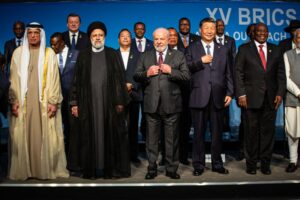Is the world order about to go into disarray? The coalition of Brazil, Russia, India, China, and South Africa, also known as BRICS, has made a dent in the West’s global economic and political hegemony. After years of the international stage being controlled by a handful of countries, be it the United States or the United Kingdom, a bloc of developing economies (is China really developing?) is attempting to embark upon a campaign of death by a thousand cuts. But will this be a successful endeavor, or will American and European might prevent a brick from being hurled at Uncle Sam’s window?
The Rise of BRICS
At its 15th annual summit in Johannesburg, South Africa, the group announced that six countries had been formally invited to join the coolest kids on the emerging market block: Argentina, Egypt, Ethiopia, Iran, Saudi Arabia, and the United Arab Emirates. If accepted, membership would go into effect in January 2024. But it might not stop at this number, as South African President Cyril Ramaphosa confirmed officials will assess potentially expanding the partnership.
The expansion, a proposal that has been discussed over the last 18 months, has many aims: advancing infrastructure, facilitating development financing, and reforming the multilateral trading system to “create a conducive environment for fair trade.”
Despite widespread expectations that the entity would announce some type of currency, officials presented different information. First, a working group will study the creation of a new reserve currency that would rival that of the US dollar. Second, BRICS will engage in bilateral and multilateral trade using local currencies, such as the rand, ruble, or rupee. Put simply, BRICS will abandon the dollar, work on establishing its currency, and use national currencies in the meantime.
In addition, there will be a BRICS+, meaning other states will be allies of the soon-to-be 11-nation faction. It will be comparable to the Organization of the Petroleum Exporting Countries (OPEC) and OPEC+, but the alliance will concentrate on economics and geopolitics.
“The Conference called for the recognition of the equality of all nations, large and small,” said President Ramaphosa in prepared remarks. “We still share that common vision of a fair and just world. We still seek to overcome polarity and division. We want a world without barriers between North and South, East and West. We still seek a world in which we work together underpinned by mutual respect.”
Heading into the summit, the New Development Bank (NDB), the so-called BRICS bank, had been busy achieving some of the de-dollarization goals outlined in South Africa, like issuing the first rand bond.
Will BRICS Break the West?
Overnight, BRICS transformed from a meaningless acronym to an international powerhouse.

(Photo by Per-Anders Pettersson/Getty Images)
With the six-nation boost to the group, BRICS GDP will represent approximately 36% of the global gross domestic product and nearly half of the world’s population. Moreover, its share of global GDP purchasing power parity will edge up to above 32%, which is higher than the Group of Seven’s 29.6%. But here is the one statistic that should have the US and its allies losing sleep at night: The reformed BRICS will control about 80% of global crude oil reserves.
This is not to say that its ascent to an apotheosis is guaranteed. There are sure to be many hurdles for the BRICS initiative to overcome, which could buy the US and its pals some time before their power is weakened. The two most prominent issues will be cooperation and financial markets.
First, having nearly a dozen countries at the table will mean it is challenging to reach a consensus, especially considering how these leaders have become accustomed to authoritarian tendencies. Remember, Russia was opposed to bolstering the size of BRICS because it would erode the criteria used when the alliance was founded a decade ago. Of course, President Vladimir Putin pretended to be ebullient over the news, congratulating the invitees in a live video link.
Second, global financial markets might not have much of an appetite for investment vehicles denominated in Chinese yuan or UAE dirham. History has shown that these emerging countries’ currencies are vulnerable to manipulation by governments and central banks. Earlier this month, the People’s Bank of China engaged in currency fixing to support the yuan. In other words, uncertainty might kill the cat.
The New Normal
BRICS is now a force to be reckoned with as these countries aren’t beholden to the United States any more. If, for instance, Saudi Arabia perturbs the White House and, as a result, is slapped with sanctions, Riyadh can trade with its allies, use their payment systems, and settle transactions in riyals. America can no longer flex its economic muscle to ensure its demands are met. Whether this is a positive or negative for the world can be debated, but acquiescing to BRICS countries will be the new normal.

